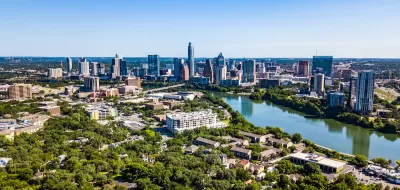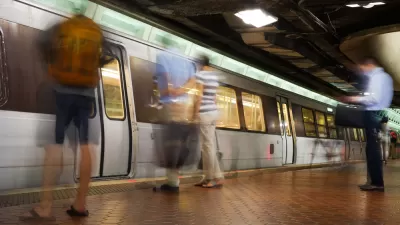With housing and transportation as the two biggest sources of carbon emissions, a new report shows how boosting density near transit would accelerate emissions reductions.

A report from the nonprofit Transit Forward indicates how Austin could meet its transportation and climate goals by supporting increased housing density, reports Nina Hernandez in Austin Monitor. “The report includes climate projections for Austin and then outlines how housing density and transit can help ease those impacts by reducing greenhouse gas emissions.”
The report notes that “the average carbon footprint for a single-family household is 100 pounds of CO2 per square meter. Dense housing units closer to the city center have lower carbon footprints.” On a map showing carbon footprints by neighborhood, the University of Texas’ West Campus numbers among the areas with the lowest average footprint. In the United States, college campuses are one rare example of walkable, mixed-use communities with dense housing and plenty of opportunities to access daily needs without a car.
The report’s recommendations include increasing housing density coupled with access to mobility and boosting local transit systems. According to Bill McCamley, executive director of Transit Forward, “We need more transit and we need more dense housing near transit because housing and transit combined, they’re number one and number two in terms of greenhouse gas emissions.”
FULL STORY: Report suggests Austin reach net-zero climate goals via housing density and increased transit

Maui's Vacation Rental Debate Turns Ugly
Verbal attacks, misinformation campaigns and fistfights plague a high-stakes debate to convert thousands of vacation rentals into long-term housing.

Planetizen Federal Action Tracker
A weekly monitor of how Trump’s orders and actions are impacting planners and planning in America.

San Francisco Suspends Traffic Calming Amidst Record Deaths
Citing “a challenging fiscal landscape,” the city will cease the program on the heels of 42 traffic deaths, including 24 pedestrians.

Defunct Pittsburgh Power Plant to Become Residential Tower
A decommissioned steam heat plant will be redeveloped into almost 100 affordable housing units.

Trump Prompts Restructuring of Transportation Research Board in “Unprecedented Overreach”
The TRB has eliminated more than half of its committees including those focused on climate, equity, and cities.

Amtrak Rolls Out New Orleans to Alabama “Mardi Gras” Train
The new service will operate morning and evening departures between Mobile and New Orleans.
Urban Design for Planners 1: Software Tools
This six-course series explores essential urban design concepts using open source software and equips planners with the tools they need to participate fully in the urban design process.
Planning for Universal Design
Learn the tools for implementing Universal Design in planning regulations.
Heyer Gruel & Associates PA
JM Goldson LLC
Custer County Colorado
City of Camden Redevelopment Agency
City of Astoria
Transportation Research & Education Center (TREC) at Portland State University
Jefferson Parish Government
Camden Redevelopment Agency
City of Claremont





























